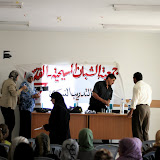This article, from the New York Times, discusses Israeli settlements in the West Bank. One of the settlements highlighted, Beitar Illit, is not too far from Bethlehem. It's a large city and is made up of mostly ultra-orthodox Jews. Ultra-orthodox Jews are Jews who are strictly observant in following their interpretation of Jewish law. There are also segments of ultra-orthodox society that do not support the modern state of Israel, arguing that only when the Messiah comes and establishes his kingdom will a state such as modern Israel be valid.
The residents of Beitar Illit and Modiin Illit, its sister city, represent one side of the settler population. They generally tend to move to these cities because housing is cheap and affordable and the neighborhoods safe and quiet. Often these types of settlers are referred to as 'quality of life' settlers; they aren't specifically moving somewhere based on a certain ideology, but rather because of ease of life or other similar circumstances. Their main goal isn't to push out non-Jews.
This article, from Haaretz, an Israeli newspaper, discusses the other type of settler, 'ideological settlers'. These are people who choose to live in a place based on the fact that they believe God has given a certain piece of territory exclusively to Jews, and that the territory is more important than any non-Jew living on it. The article points out how the Israeli army, which is largely supposed to be responsible for law and order in the West Bank (excluding areas controlled by the Palestinian Authority, which are few and far between), allows Israeli citizens to begin construction and erect buildings in places they know are likely to cause conflict.
Each perspective is correct: there are 'settlers' who would willingly leave the West Bank provided they had adequate compensation and new housing to move to, and there are 'settlers' who wouldn't leave regardless of the compensation offered and would even fight the Israeli government should the state of Israel decide to leave the West Bank. This is just one of the many issues that can be interpreted different ways. Some settlers are willing to leave and live in peace, other settlers are determined to remain on the land regardless of the consequences or cost. In our work here we try to continue to find the courage to challenge the latter and the grace to encourage the former.
Tuesday, July 28
Wednesday, July 8
YMCA Graduation at Um Solomona
MCC workers were able to visit the village of Um Solomona with the YMCA, one of MCC's partners in Palestine Israel. The Women's Training Program offers 6 month training courses in rural villages to help educate participants about animal husbandry and care, crop production and farming, and economics and environment. We visited on the day of graduation and were able to take some photographs with some of the participants. Not wanting to merely photograph the women and not see them again, we returned a few weeks later in order to pass out some of the pictures we had taken. We didn't know the names of any of the women, but with the population of Um Solomona being less than 1,000 people, we were confident we could show some pictures and ask around a bit. Sure enough, the first person we stopped and asked knew the woman in the first picture, and when we got closer to the house and asked a group of children which house we should go to, they were falling over themselves to help us find it.
We're always blessed when we're able to enter someone's home or village that doesn't usually have foreign guests, and on a personal level we almost always end up 'getting' more than we 'give'. These visits are our opportunity to be the face of MCC to people that otherwise wouldn't know about the work that people from home support.
We're always blessed when we're able to enter someone's home or village that doesn't usually have foreign guests, and on a personal level we almost always end up 'getting' more than we 'give'. These visits are our opportunity to be the face of MCC to people that otherwise wouldn't know about the work that people from home support.
 |
| YMCA WTP Graduation |
Subscribe to:
Comments (Atom)
